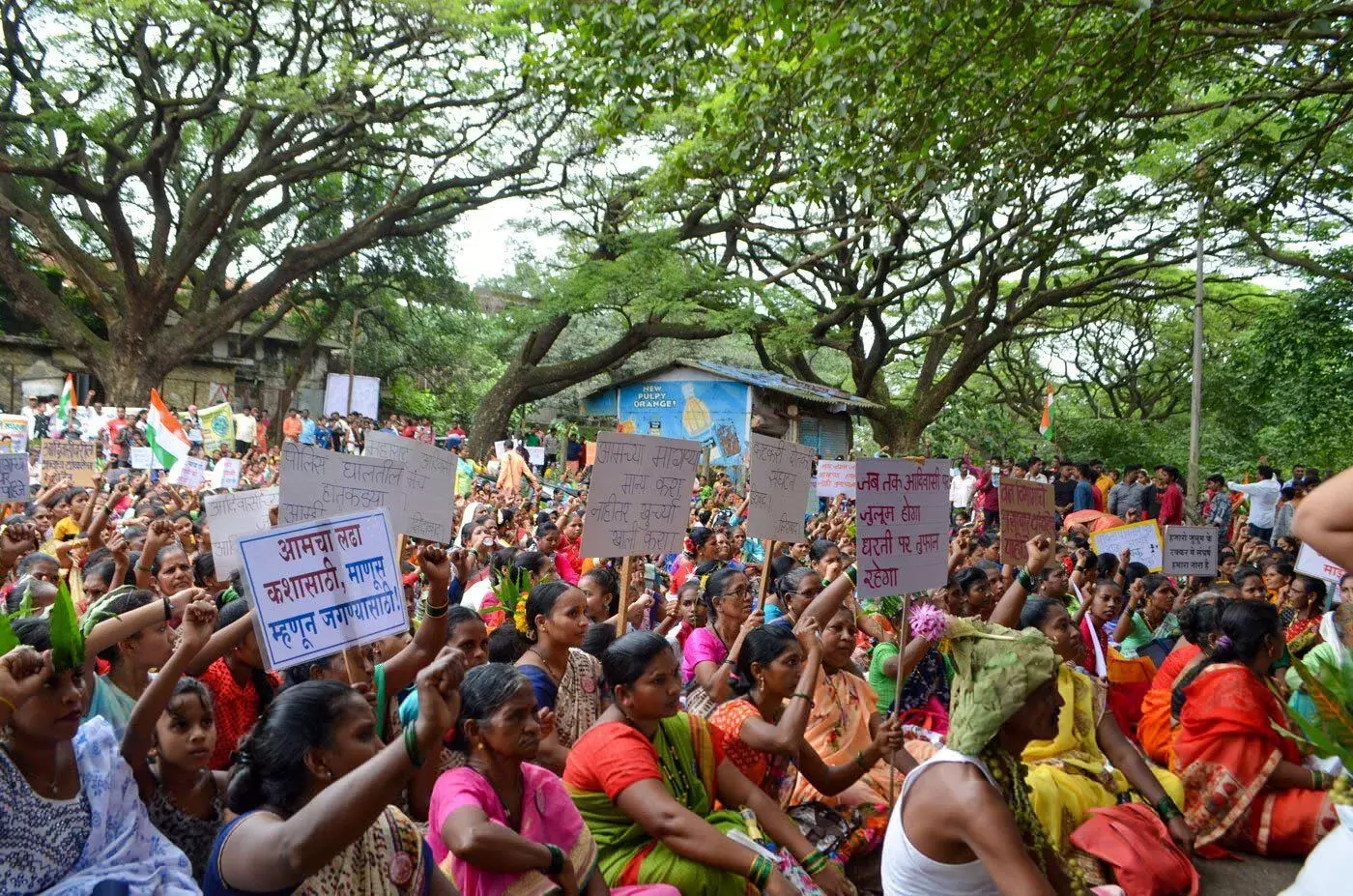‘Development’ Continues to Displace Tribes, Adivasis Seek Justice
Demand release of anti-mining protesters arrested in Maharashtra’s Gadchiroli

Activists have raised concerns about the land grabbing and displacement of tribal communities in different parts of the country. Over the years, thousands of Adivasi and Dalit communities have reportedly been displaced due to various projects.
According to a 2011 study by Social Science Open Access Repository, around 50 million people have been displaced in India due to ‘development’ projects in over 50 years. Of these, dams, mines, industrial development and others account for the displacement of over 21 million ‘development’ induced Internally Displaced Persons [IDPs]. Of these, the Adivasi communities, constituting about 40%, are the worst affected.
On the other hand, as people protest against these proposed or ongoing projects, they are faced with police brutality and cases against them.
On Monday, 21 people who were part of an anti-mining agitation in Maharashtra’s Gadchiroli district were detained after they allegedly stopped the way of security personnel heading towards a police station, officials said.
On Tuesday, it was revealed that the arrested people have been slapped with Section 353 (assault or criminal force to determine public servant from discharge of his duty).
Residents of more than 70 tribal-dominated villages have been protesting in Todgatta village for over 250 days against six iron mines proposed at Surjagarh in Gadchiroli.
Punem Jetti, a local sarpanch in Surjagarh area and a leader in the anti-displacement struggle, whose husband has also been arrested said that the “state repression has brutally suppressed the democratic process”.
“The people were lathi charged and some people were arrested. Usually people are arrested in cars, but they were taken away in helicopters. My husband and I both support the protest. It is the duty of every Adivasi family to protect jal-jangal-jameen,” she said during a press conference here.
In the same regard, a public meeting was held at the Press Club of India in New Delhi on November 20, where the Forum Against Corporatization and Militarization (FACAM) spoke about “Anti-Displacement Movement & State Repression”.
The speakers acknowledged the urgency and necessity to foster discussions in solidarity with the ongoing struggles against displacement. This gathering also aimed to bring attention to the crucial issues of displacement and repression often overlooked in mainstream media and civil society discussions.
“Our rights and demands are being curbed by the authorities in the name of development projects that are against the tribal people. Our ancestors have fought for this land and currently we have reached the same stage where we have to fight over this same issue,” Jetti said.
According to a report on “mining, repression and resistance” released by Damkondawahi Bachao Sangharsh Samiti, since March 11, 2023, villages from across the Surjagad and Damkondwahi areas began indefinitely protesting.
The protest is led by the Madia-Gond Adivasi community. Representatives from over 70 villages have been taking turns to occupy a stretch of land in Todgatta. Several temporary huts or dheras have been built to house the representatives from the different villages.
The protesters have averred that ever since the start of the agitation, the authorities are trying to stop them.
However, the Gadchiroli police in a statement said a police station at Wangeturi on Maharashtra-Chhattisgarh border in Etapalli taluka here was proposed to be inaugurated on Monday.
They added that when the police parties from Gatta along with C-60 teams, a special anti-Maoist commando force of Maharashtra, were going towards Wangeturi through Todgatta, the agitators stopped them from going ahead.
Meanwhile, advocate Lalsu Nagoti who was part of the panel talked about how mining companies are destroying the natural habitat and displacing the Adivasi communities from their land.
“The company promised us employment and development. We do not require either. We have always been living in harmony with nature. We are self-sustaining. We have land, water, and access to so many resources. Many regions are backward in the real sense.
“Why do the companies want to hamper a harmonious existence? How is displacing hundreds of people, destroying the environment we call home, in exchange for employing a few men termed as development,” Nagoti asked.
Prafulla Samantara, Environmental Activist from Odisha, said it was important for the people to choose the government wisely.
“Every political party, to support the economy and compete with other nations, takes the route of over exhausting natural resources. Everything is interconnected. When the naturally available resources are overused, the water levels are also impacted, leaving less freshwater for us to consume and use for farming,” Samantara added.
Madhusudan from Mulniwasi Samajsevak Sangh drew a connection between corporatisation and casteism. “This stems from the already existing status quo wanting to establish control over the indigenous communities who are otherwise self-sufficient. Displacement is dependent on caste, class, cultural movements, climate change, and capitalism,” Madhusudan said.
Meanwhile, the civil society demanded the release of 21 protesters alleging that the claims were false and that the “village members were fabricated by the police in order to suppress the protest”.
Cover Photograph Courtesy People’s Archive of Rural India



